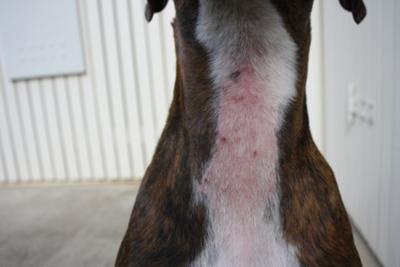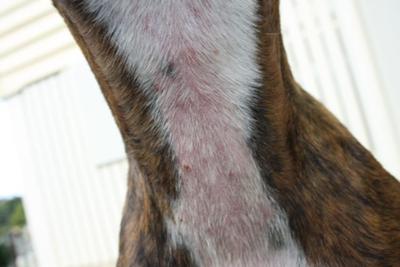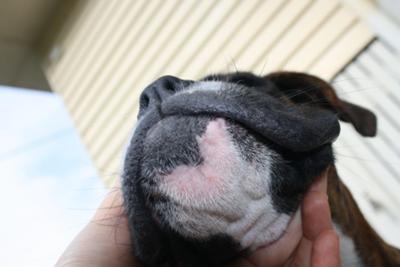by Klaudia Edmondson
(Brisbane, Australia)

Rash on Neck with Pimples

Rash on Neck with Pimples

Rash on Jaw with Pimples (hard to see)
I have a 12 month old female Boxer (Stella) and I have been trying to get on top of her skin rash for the past 6 months.
Currently she has a constant red rash on her neck and underside of her jaw (the tip). She scratches very hard on her jaw sometimes. Sometimes she will have a few small red bumps on her belly and she licks her genitals & tries to bite at the base of her tail. Occasionally she will also lick/chew on her paws. There are tiny little black spots in between her toes.
I will give you a history run-down first:
1. At about 4-5 months Stella had an ear infection. I discovered it quite late and due to this she also had further infections on her skin (mostly under her armpits, they got swollen and red). Once this was treated, she seemed fine. The vet also recommended to bathe Stella regularly with Malaseb Medical Shampoo.
2. At 6 months of age Stella was spayed and a few days after she started licking her paws a lot to the point where they got really red and infected. She was on antibiotics to help heal her wound. I tried to keep the paw licking under control with wiping her down after every walk and it seemed to keep it in check, but she never fully recovered from it. I tried various things like Epsom salts, oatmeal rinse, raw apple cider vinegar....all of which reduced the symptoms slightly but never fully healed her.
3. I tried to change her food (I always fed raw but now tried different brands and go from different angles - I live in Australia and even tried kangaroo meat). I contacted a naturopath who assessed Stella through a hair sample (bio-compatibility test) but it was no real allergy test for pollens or environmental triggers. So really it didn't
help much. Any supplements/homeopathic skin formulas didn't really work.
4. I visited the vet and he prescribed antibiotics and steroids to treat the symptoms but this failed. She responded only the first couple of days whilst the dose was high but as soon as the dose lowered the pimples came back on her neck.
5. She is an outside dog and sometimes digs in dry soil near the house where the grass doesn't grow. She also chews on the grass sometimes or the odd plant (I have already removed a few plants that she often chewed on).
6. I have changed her bedding to a flea resistant type.
7. She receives natural flea treatment and homeopathic tick prevention formula. I also give her the usual monthly all-rounder wormer chews. Previous to the natural flea/tick formula I gave her sentinel instead.
8. Since the 12th of June (about a month ago) I have fed Stella only raw chicken (minced chicken frames from the butcher), whole chicken frames, veggie pulp and a health booster supplement. I wanted to see if the food is the cause, but the rash is on & off (or less inflamed and more inflamed) from time to time. It has never completely gone away but she is about 70% better than she was 6 months ago.
9. When she developed her severe rash 6 months ago, it was high summer.
10. I haven't bathed her for at least 4 months, as I don't think it is necessary and she really doesn't seem to need it (her coat looks nice and doesn't smell).
My questions are:
1. What allergy do you think Stella suffers from (food, flea, bacterial, atopy, environmental)?
2. What treatment do you suggest?
3. Is it safe to keep feeding her just raw chicken and supplements for the time being?
Attached are some photos.
I look forward to your reply.
Regards,
Klaudia
Do you believe in holistic pet care? If so, please tell your friends about us, and visit our Organic Pet Digest social media accounts. Thank you for supporting our efforts!







